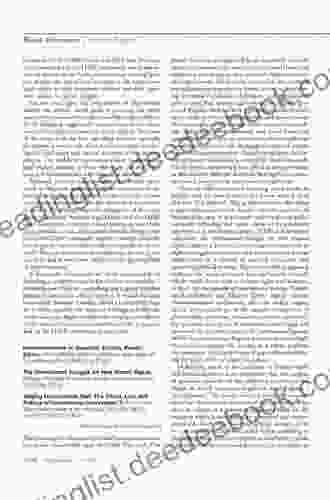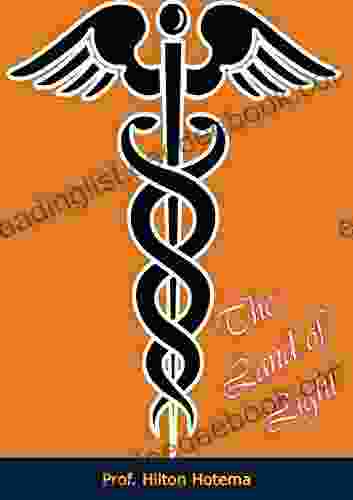Humanitarianism In Question: Politics, Power, and Ethics

Cornell University Press, 2011
In recent years, humanitarianism has come under increasing scrutiny. Critics have charged that it is often ineffective, inefficient, and even harmful. They argue that humanitarian aid can prolong conflict, create dependency, and undermine local institutions. Some critics have even gone so far as to claim that humanitarianism is a form of imperialism, designed to impose Western values on the rest of the world.
In Humanitarianism In Question, Michael Barnett argues that these criticisms are overstated. He acknowledges that humanitarianism is not always effective, but he insists that it is often the best option available. He argues that humanitarian aid can save lives, reduce suffering, and promote peace. He also argues that humanitarianism is not a form of imperialism, but rather a genuine expression of human solidarity.
4 out of 5
| Language | : | English |
| File size | : | 1667 KB |
| Text-to-Speech | : | Enabled |
| Screen Reader | : | Supported |
| Enhanced typesetting | : | Enabled |
| Word Wise | : | Enabled |
| Print length | : | 324 pages |
| Item Weight | : | 11.2 ounces |
| Dimensions | : | 5.9 x 0.5 x 8.9 inches |
| X-Ray for textbooks | : | Enabled |
| Paperback | : | 172 pages |
Barnett's book is a timely and important contribution to the debate about humanitarianism. He offers a nuanced and balanced analysis of the strengths and weaknesses of humanitarianism, and he provides a powerful defense of its core principles.
In the first chapter of his book, Barnett examines the political context of humanitarian aid. He argues that humanitarianism is not a neutral activity, but rather a political act. Humanitarian aid is often used to promote the interests of powerful states and organizations, and it can be used to manipulate and control populations.
Barnett provides several examples of how humanitarian aid has been used for political purposes. He cites the case of the United States, which has used humanitarian aid to support its foreign policy goals in countries such as Iraq and Afghanistan. He also cites the case of the United Nations, which has been accused of using humanitarian aid to buy influence and control governments.
Barnett argues that the politicization of humanitarian aid is a serious problem. He argues that it undermines the credibility of humanitarian organizations and makes it more difficult to provide aid to those who need it most.
In the second chapter of his book, Barnett examines the power of humanitarian aid. He argues that humanitarian aid can be a powerful tool for good, but it can also be used for harmful purposes.
Barnett provides several examples of how humanitarian aid has been used for good. He cites the case of the Red Cross, which has provided life-saving assistance to victims of war and disaster for over a century. He also cites the case of Doctors Without Borders, which has provided medical care to people in conflict zones and other dangerous places.
However, Barnett also acknowledges that humanitarian aid can be used for harmful purposes. He cites the case of the Khmer Rouge, which used humanitarian aid to starve and torture the Cambodian people. He also cites the case of the Rwandan genocide, in which humanitarian aid was used to support the perpetrators of the genocide.
Barnett argues that the power of humanitarian aid is a double-edged sword. It can be used to save lives and reduce suffering, but it can also be used to manipulate and control populations. He argues that it is important to be aware of the potential risks of humanitarian aid, and to use it wisely.
In the third chapter of his book, Barnett examines the ethics of humanitarian aid. He argues that humanitarianism is based on a number of ethical principles, including the principle of humanity, the principle of impartiality, and the principle of neutrality.
The principle of humanity holds that all human beings have a right to life and dignity, regardless of their race, religion, or political beliefs. The principle of impartiality holds that humanitarian aid should be provided to those who need it most, regardless of their political affiliations or other factors. The principle of neutrality holds that humanitarian organizations should not take sides in political conflicts.
Barnett argues that these ethical principles are essential to the legitimacy of humanitarianism. He argues that humanitarian organizations must adhere to these principles in order to maintain their credibility and their ability to provide assistance to those who need it most.
In the fourth chapter of his book, Barnett examines the future of humanitarian aid. He argues that humanitarianism is facing a number of challenges, including the rise of new technologies, the changing nature of conflict, and the increasing politicization of humanitarian aid.
Barnett argues that humanitarian organizations need to adapt to these challenges in order to remain effective. He argues that they need to become more innovative, more efficient, and more accountable. He also argues that they need to work more closely with local organizations and communities.
Barnett concludes his book by arguing that humanitarianism is more important than ever before. He argues that the world is facing a number of humanitarian crises, and that humanitarian aid is essential to saving lives and reducing suffering. He argues that we must continue to support humanitarianism, and that we must work to make it more effective and more ethical.
Humanitarianism In Question is a timely and important contribution to the debate about humanitarianism. Michael Barnett offers a nuanced and balanced analysis of the strengths and weaknesses of humanitarianism, and he provides a powerful defense of its core principles. This book is essential reading for anyone who is interested in humanitarianism, or who is concerned about the future of human rights.
4 out of 5
| Language | : | English |
| File size | : | 1667 KB |
| Text-to-Speech | : | Enabled |
| Screen Reader | : | Supported |
| Enhanced typesetting | : | Enabled |
| Word Wise | : | Enabled |
| Print length | : | 324 pages |
| Item Weight | : | 11.2 ounces |
| Dimensions | : | 5.9 x 0.5 x 8.9 inches |
| X-Ray for textbooks | : | Enabled |
| Paperback | : | 172 pages |
Do you want to contribute by writing guest posts on this blog?
Please contact us and send us a resume of previous articles that you have written.
 Book
Book Page
Page Chapter
Chapter Story
Story Genre
Genre Magazine
Magazine Sentence
Sentence Shelf
Shelf Glossary
Glossary Preface
Preface Annotation
Annotation Manuscript
Manuscript Scroll
Scroll Codex
Codex Bestseller
Bestseller Classics
Classics Narrative
Narrative Biography
Biography Autobiography
Autobiography Memoir
Memoir Reference
Reference Encyclopedia
Encyclopedia Narrator
Narrator Character
Character Catalog
Catalog Card Catalog
Card Catalog Stacks
Stacks Archives
Archives Study
Study Research
Research Scholarly
Scholarly Lending
Lending Reserve
Reserve Journals
Journals Special Collections
Special Collections Interlibrary
Interlibrary Literacy
Literacy Study Group
Study Group Thesis
Thesis Book Club
Book Club Paul Frijters
Paul Frijters Annie Tyson
Annie Tyson Wendy Walsh
Wendy Walsh Michael Crawley
Michael Crawley Tiffany Casper
Tiffany Casper Mitch Ploskonka
Mitch Ploskonka Leni Matlin
Leni Matlin Tom Mchale
Tom Mchale Catherine Balavage
Catherine Balavage Clive Matthews
Clive Matthews Paul G Young
Paul G Young Ejike Ifeanyichukwu
Ejike Ifeanyichukwu Bob Lewis
Bob Lewis Indro Neri
Indro Neri Jo Nesbo
Jo Nesbo Lois Ellfeldt
Lois Ellfeldt Colm Keena
Colm Keena Amandine Orsini
Amandine Orsini Fransje De Waard
Fransje De Waard Harley Reid
Harley Reid
Light bulbAdvertise smarter! Our strategic ad space ensures maximum exposure. Reserve your spot today!
 Earl WilliamsFollow ·10k
Earl WilliamsFollow ·10k Dwayne MitchellFollow ·19.6k
Dwayne MitchellFollow ·19.6k Kelly BlairFollow ·9.1k
Kelly BlairFollow ·9.1k Cade SimmonsFollow ·18.8k
Cade SimmonsFollow ·18.8k Griffin MitchellFollow ·3.6k
Griffin MitchellFollow ·3.6k Albert ReedFollow ·9.4k
Albert ReedFollow ·9.4k Marvin HayesFollow ·14.4k
Marvin HayesFollow ·14.4k Ernesto SabatoFollow ·17.6k
Ernesto SabatoFollow ·17.6k

 Diego Blair
Diego BlairUnveiling Hidden Crete: A Comprehensive Review of Richard...
In the tapestry of travel literature,...

 Earl Williams
Earl WilliamsNew Addition Subtraction Games Flashcards For Ages Year
Looking for a fun...

 Julio Ramón Ribeyro
Julio Ramón RibeyroUnveiling the Nexus of Educational Politics and Social...
Education, a fundamental pillar of society,...

 Jordan Blair
Jordan BlairTrains, Planes, Ships, and Cars: The Evolution of...
Transportation...

 Derek Bell
Derek BellFalling for Rachel Stanislaki: An Unforgettable Literary...
Step into the...

 Harry Cook
Harry CookAn Introduction to Cardiac Surgery for Anesthesia...
Cardiac surgery is a specialized...
4 out of 5
| Language | : | English |
| File size | : | 1667 KB |
| Text-to-Speech | : | Enabled |
| Screen Reader | : | Supported |
| Enhanced typesetting | : | Enabled |
| Word Wise | : | Enabled |
| Print length | : | 324 pages |
| Item Weight | : | 11.2 ounces |
| Dimensions | : | 5.9 x 0.5 x 8.9 inches |
| X-Ray for textbooks | : | Enabled |
| Paperback | : | 172 pages |












